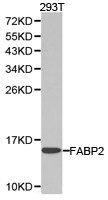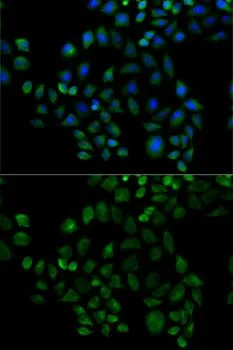![FACS analysis of LOVO cells using GTX83361 FABP2 antibody [9A9B7B3]. Green : FABP2 Purple : negative control FACS analysis of LOVO cells using GTX83361 FABP2 antibody [9A9B7B3]. Green : FABP2 Purple : negative control](https://www.genetex.com/upload/website/prouct_img/normal/GTX83361/GTX83361_20170912_FACS_w_23061322_299.webp)
FACS analysis of LOVO cells using GTX83361 FABP2 antibody [9A9B7B3]. Green : FABP2 Purple : negative control
FABP2 antibody [9A9B7B3]
GTX83361
ApplicationsFlow Cytometry, ImmunoFluorescence, Western Blot, ELISA, ImmunoCytoChemistry, ImmunoHistoChemistry, ImmunoHistoChemistry Paraffin
Product group Antibodies
ReactivityHuman, Mouse
TargetFABP2
Overview
- SupplierGeneTex
- Product NameFABP2 antibody [9A9B7B3]
- Delivery Days Customer9
- Application Supplier NoteWB: 1/500 - 1/2000. ICC/IF: 1/200 - 1/1000. IHC-P: 1/200 - 1/1000. FACS: 1/200 - 1/400. ELISA: 1/10000. *Optimal dilutions/concentrations should be determined by the researcher.Not tested in other applications.
- ApplicationsFlow Cytometry, ImmunoFluorescence, Western Blot, ELISA, ImmunoCytoChemistry, ImmunoHistoChemistry, ImmunoHistoChemistry Paraffin
- CertificationResearch Use Only
- ClonalityMonoclonal
- Clone ID9A9B7B3
- ConjugateUnconjugated
- Gene ID2169
- Target nameFABP2
- Target descriptionfatty acid binding protein 2
- Target synonymsFABPI, I-FABP, fatty acid-binding protein, intestinal, fatty acid binding protein 2, intestinal, intestinal-type fatty acid-binding protein
- HostMouse
- IsotypeIgG1
- Protein IDP12104
- Protein NameFatty acid-binding protein, intestinal
- Scientific DescriptionThe intracellular fatty acid-binding proteins (FABPs) belong to a multigene family with nearly twenty identified members. FABPs are divided into at least three distinct types, namely the hepatic-, intestinal- and cardiac-type. They form 14-15 kDa proteins and are thought to participate in the uptake, intracellular metabolism and/or transport of long-chain fatty acids. They may also be responsible in the modulation of cell growth and proliferation. Intestinal fatty acid-binding protein 2 gene contains four exons and is an abundant cytosolic protein in small intestine epithelial cells. This gene has a polymorphism at codon 54 that identified an alanine-encoding allele and a threonine-encoding allele. Thr-54 protein is associated with increased fat oxidation and insulin resistance. [provided by RefSeq, Jul 2008]
- ReactivityHuman, Mouse
- Storage Instruction-20°C or -80°C,2°C to 8°C
- UNSPSC12352203

![ICC/IF analysis of 3T3-L1 cells using GTX83361 FABP2 antibody [9A9B7B3]. Green : FABP2 Blue: DRAQ5 fluorescent DNA dye Red: Actin filaments ICC/IF analysis of 3T3-L1 cells using GTX83361 FABP2 antibody [9A9B7B3]. Green : FABP2 Blue: DRAQ5 fluorescent DNA dye Red: Actin filaments](https://www.genetex.com/upload/website/prouct_img/normal/GTX83361/GTX83361_20170912_ICCIF_w_23061322_452.webp)
![WB analysis of FABP2-hIgGFc transfected HEK293 (1) cell lysate and LOVO (2) cell lysate using GTX83361 FABP2 antibody [9A9B7B3]. WB analysis of FABP2-hIgGFc transfected HEK293 (1) cell lysate and LOVO (2) cell lysate using GTX83361 FABP2 antibody [9A9B7B3].](https://www.genetex.com/upload/website/prouct_img/normal/GTX83361/GTX83361_20170912_WB_w_23061322_110.webp)
![IHC-P analysis of human Small Intestine tissue using GTX83361 FABP2 antibody [9A9B7B3]. IHC-P analysis of human Small Intestine tissue using GTX83361 FABP2 antibody [9A9B7B3].](https://www.genetex.com/upload/website/prouct_img/normal/GTX83361/GTX83361_20170912_IHC-P_w_23061322_537.webp)
![IHC-P analysis of rat intestine tissue section using GTX03192 FABP2 antibody [GT1280]. Dilution : 1:100](https://www.genetex.com/upload/website/prouct_img/normal/GTX03192/GTX03192_20210615_IHC-P_45_w_23053123_694.webp)






